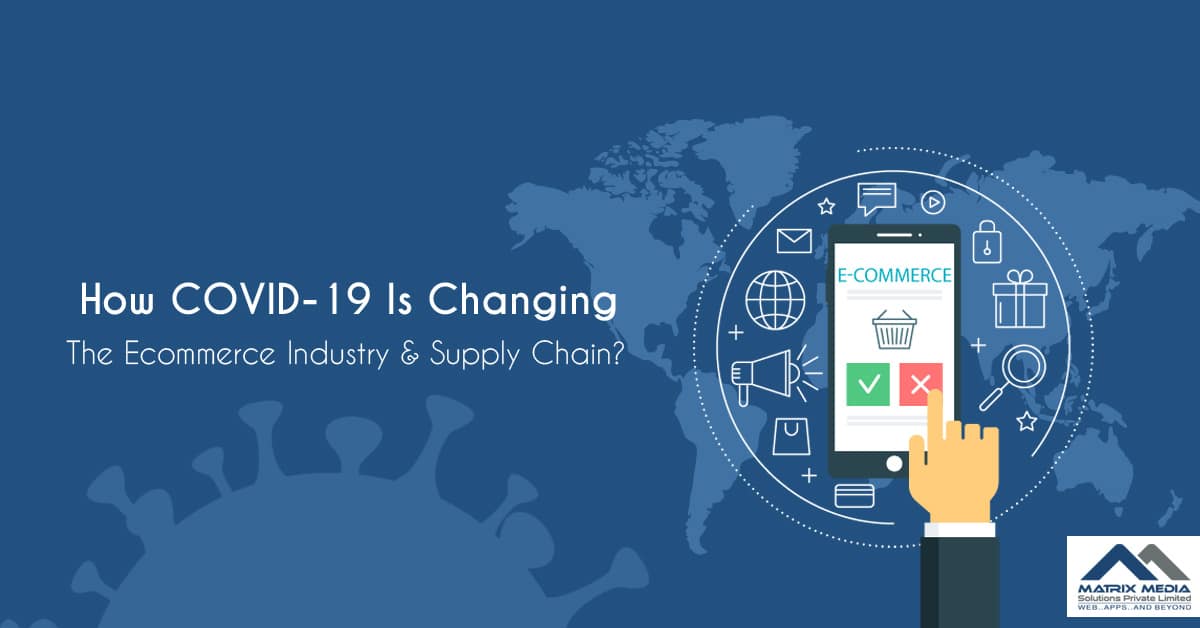Let’s accept it. The Novel Coronavirus (COVID-19) is spreading across the globe like fire. With the whole world under its grip, the deadly virus has changed every aspect of life, starting from social to political and even economical. There is no denying of the fact that this pandemic has impacted businesses of all verticals. Even the E-Commerce and supply chain industry is not spared from its wrath.
However, the effect of this virus is both good and bad for the E-Commerce industry and its supply chain. Wow!
Now, does that sound interesting to you? Well, it’s going to have an impact on the global E-Commerce market.
Without wasting any more time, let’s take a quick look into the ways Coronavirus is affecting the world of E-Commerce. Don’t worry! You will get to know some ways through which any E-Commerce industry could handle these effects.
Effect of Coronavirus on E-Commerce Industry
Marketing experts predict that E-Commerce sales will surge as the number of people affected by novel coronavirus starts to increase and social distancing becomes a normal norm. With more people preferring to stay indoors, a huge change could be seen in their shopping behavior.
With most of the cities and countries under lockdown and non-essential businesses being instructed to close, many people are resorting to online shopping. Even though essential services are open, still people are relying on online platforms to purchase their daily essentials. Brands are adapting to these changing needs slowly. However, some of the brands are worried about the fact that their sales would drop due to product shortage and supply chain issues.
COVID-19: The Bad Side Of it on E-Commerce
Till now, the supply chain industry has been greatly affected by this deadly virus. Why? It’s pretty simple. Most of the E-Commerce companies have their manufacturing hub in China or relies on China for raw materials. Since these regions are under quarantine, online retailers are mostly affected as they don’t have sufficient stocks.
According to some experts, the market for wearable products is going to witness slow growth. It would see a significant drop from last year’s 89% growth rate. For 75% of e-commerce companies, transport restriction and quarantine have put their business operations in jeopardy. Nearly, 44% of organizations are not at all prepared to handle the supply chain disruption.
However, the effect of COVID-19 on e-commerce is not completely negative. Apart from e-commerce businesses like fashion or gadgets might be facing disruptions in the supply chain; however, some e-commerce businesses are flourishing.
COVID-19: The Good Side Of it on E-Commerce
With World Health Organization (WHO) declaring COVID-19 as a global public health emergency of international concern, many people started to stock-up essential commodities, like hand sanitizer, masks, toilet paper, and so on. However, with the government asking its citizens to avoid crowded places, many people started to take the help of e-commerce platforms to buy their essentials.
The e-commerce industry which was once deemed optional or luxury for some, it’s now regarded to be the live saver to businesses as well as to customers. Since this pandemic, there has been an increase in online sales by 52%. Even there has been an increase in the number of online shoppers.
Due to this COVID-19 and quarantine effect, many businesses like grocery delivery or healthcare supply are taking the help of e-commerce platforms to deliver groceries and healthcare products to customers. If one takes a close look, one gets to see that not only the millennials but also the older generation are switching to e-commerce platforms and avoiding venturing out.
How E-commerce Industry Can Meet With The Challenges?
Why every business verticals, including the e-commerce, is so much affected by this COVID-19 pandemic? Have you ever contemplated it? Well, none of us expected such a massive disease will turn the whole world topsy-turvy and affect every aspect of our life. As a result, every industry is facing a steep decline and they don’t have any knowledge about how to remain protected.
There is a reason to freak out. However, some steps could be taken to protect the e-commerce business. They are:
Remaining Transparent and Tactful
Many online businesses are taking advantage of this situation like market uncertainty and fears of the customers. However, market experts are warning those e-commerce businesses from making such moves. Studies have shown that such moves might be helpful for the short term; yet, in the long-run, it would cause great damage to the business. Business houses should respond to customers with sympathy and compassion.
E-commerce businesses should maintain complete transparency at this hour. They should address customer grievances like delay in delivery or internal sanitation of stores or warehouses publicly. When customers see that a business is taking proper steps towards sanitization, they would prefer the business more.
Diversify Supply Chain
Most of the e-commerce businesses are facing a serious supply chain crisis. The reason is simple. Most of the supply chain hub is located in China. E-commerce businesses by diversifying their supply chain centres in various places would ensure that the product supply to customers doesn’t get disrupted in the near future. Implementing this step might take much time if one takes a look at the uncertainty but it is no that tough also.
Don’t Go Overboard with Communication
Yeah! Yeah! We know communication is vital for e-commerce businesses. However, one should focus on what’s important and avoid unnecessary talks or over-communication. So make sure, your business shares only positive things.
Keep Advertising
During economic turmoil like this, most companies might cut back their economic expenditure. Even if you think it to be the right, it would be fatal for your business. You shouldn’t stop advertising or marketing your business. Sales would drop. It’s natural. But if you focus on advertising or marketing at this time, it would help your business later on. You can strike the right tone with your customers by trying to understand their needs and meet them. Hopefully, it would boost the relationship with your customers.
The COVID-19 situation is changing rapidly across the globe. It’s not easy to foresee the future. However, these are some basic steps that e-commerce businesses could take and evade some negative impacts of COVID-19.


 January 30, 2023
January 30, 2023

